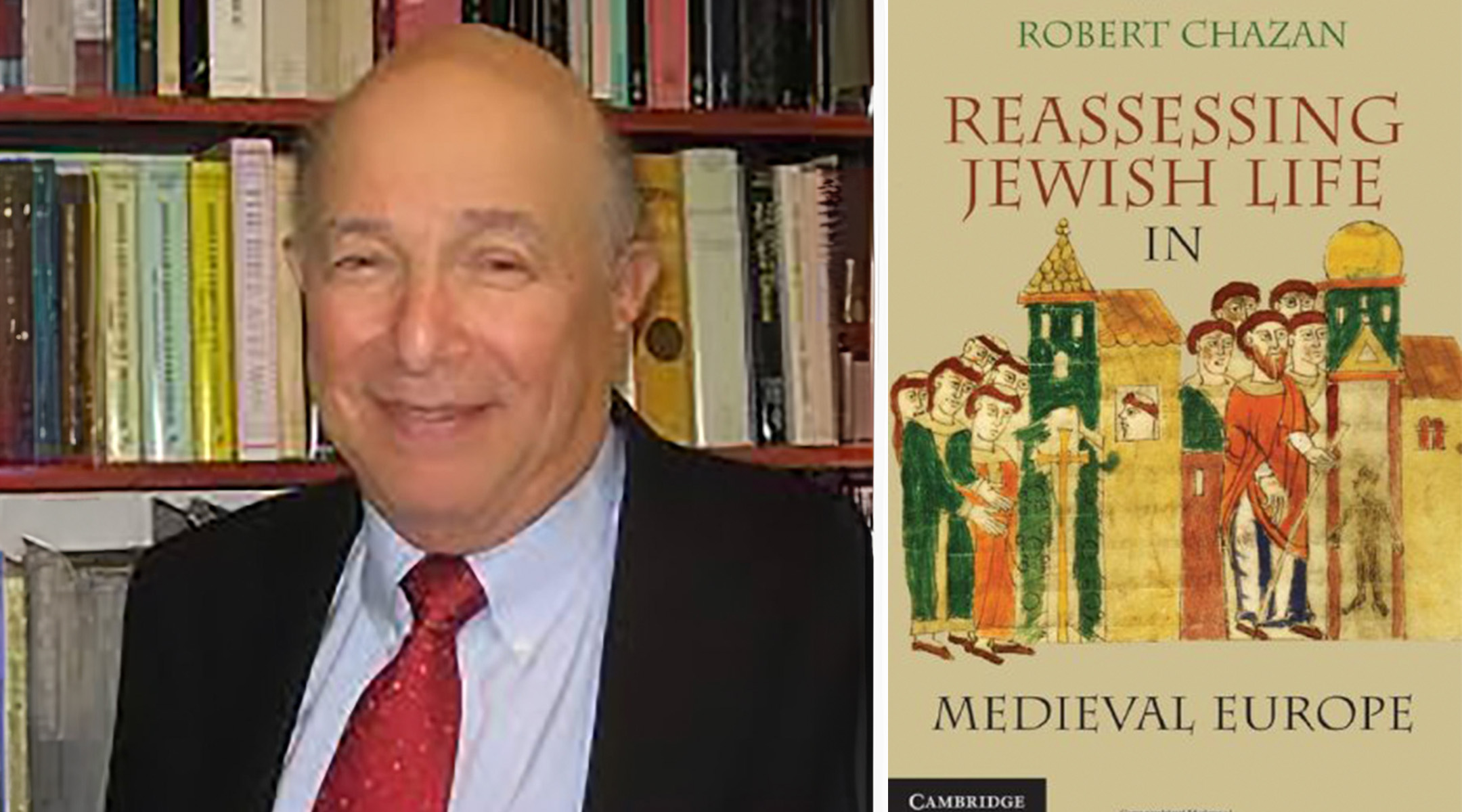Robert Chazan, NYU scholar of medieval Jewry who helped build field of Jewish studies, dies at 87
When he earned his doctorate in 1967, Chazan led an effort to expand Jewish studies to institutions “all over the country”

Robert Chazan was one of the leading scholars in the field of Jewish history and Christian-Jewish relations in the high Middle Ages. (NYU; Cambridge University Press)
(JTA) — When Robert Chazan was studying toward his Ph.D. from Columbia University in the mid-1960s, few major American universities were offering positions to Jewish studies scholars.
The field was regarded as too provincial and the American university system was alien to the European-trained scholars who were teaching the topic at places like Yeshiva University, the Jewish Theological Seminary, Hebrew Union College and, among the few non-Jewish institutions, Columbia and Harvard.
That would change over the next decade, as young scholars like Chazan and a new organization, the Association for Jewish Studies, began attracting funding and interest. Soon, the number of scholars receiving chairs in Jewish studies or funded positions exploded. Chazan was among those leading the charge as a scholar at Ohio State University, Queens College and New York University, and as a member and later president of the American Academy for Jewish Research, a wealthy but sleepy association founded by an old guard.
Among other things, the new generation insisted that Jewish studies scholars match the standards expected of academics in other fields.
“The idea was: Let’s bring the American Academy for Jewish Research into this new reality, where Jewish Studies isn’t restricted to a couple of Jewish institutions, but is all over the country,” Chazan, who served as president of the AAJR from 1995-2000, said in an interview.
Chazan, one of the leading scholars in the field of Jewish history and Christian-Jewish relations in the high Middle Ages, died Feb. 12. He was 87.
His death was announced by the Wexner Graduate Fellowship, a program that prepared graduate students for careers in the clergy, academic Jewish studies and Jewish communal service. He chaired its advisory committee for 25 years.
Chazan was the S.H. and Helen R. Scheuer Emeritus Professor of Hebrew & Judaic Studies at New York University, where, as founding chair of the Skirball Department of Hebrew and Judaic Studies, he championed dual-degree programs for future Jewish professionals through the Wagner School of Public Administration and the Steinhardt School of Education.
The author of nine books and dozens of articles, his work, according to the Encyclopedia Judaica, “is characterized by a nuanced perspective on Jewish-Christian relations that were not by any means always characterized by hostility.” In books like “In the Year 1096: The Jews and the First Crusade” and “Reassessing Jewish Life in Medieval Europe,” he depicted Jews “not only as victims but also as people actively confronting the core issues of the day in a manner that mirrors the efforts of the surrounding Christian majority.”
In 1998, he won the National Jewish Book Award in Jewish History for “European Jewry and the First Crusade.”
Chazan was born in 1936, the son of Abraham and Ida Chazan, and grew up in Albany, New York. He received his B.A. from Columbia College in 1958 and his rabbinical ordination from JTS in 1962. He taught at JTS as a graduate student from 1962–1967. At Columbia, he was a student of Salo Wittmeyer Baron, a pioneering figure in Jewish studies at Columbia from 1930 until his retirement in 1963.
At a Columbia seminar with the philosopher Justus Buchler, Chazan recalled, he was reluctant to describe his own career plans, assuming that there were few opportunities for a full-time scholar of Jewish studies. Instead, Buchler told him, “What a great idea … If you were finishing now, there wouldn’t be a job available for you.” But the American campus, said Buchler, “is going to change over the next decade and by the time you finish” there will be positions.
Buchler was prophetic. Chazan finished his dissertation, on 13th-century Jewry in Northern France, in 1967, “right at the point that a new program had been created at Ohio State, and I secured the new position.” He taught at Ohio State University from 1967–1980, where he also served as director of the Melton Center for Jewish Studies. After a brief stay at Tel Aviv University, Chazan moved to Queens College of the City University of New York, where he served from 1981–87, including as director of the Center for Jewish Studies. From 1987 has served as Scheuer Professor of Jewish Studies at New York University.
Among those paying tribute to Chazan was historian Jeffrey Woolf, who contributed an essay to the sixth volume of the “Cambridge History of Judaism,” which was edited by Chazan. “From our interactions I learned that not only was he a scholar of the first rank, he was also very much a mensch,” Woolf wrote on Facebook.
In addition to leading AAJR, Chazan was president of the Association for Jewish Studies from 1988–1991. “Studies in Medieval Jewish Intellectual and Social History,” a festschrift, or collection of essays in his honor, appeared in 2012. In their introduction, the editors noted his scholarship, his role in building the field of Jewish studies and his efforts training professionals dedicated to Jewish communal service and education.
“To all of these efforts,” they wrote, “he has consistently brought his impeccable scholarly credentials, his administrative acumen, and the integrity and friendship for which he is so well known.”
A list of survivors was not immediately available.
This article originally appeared on JTA.org.















